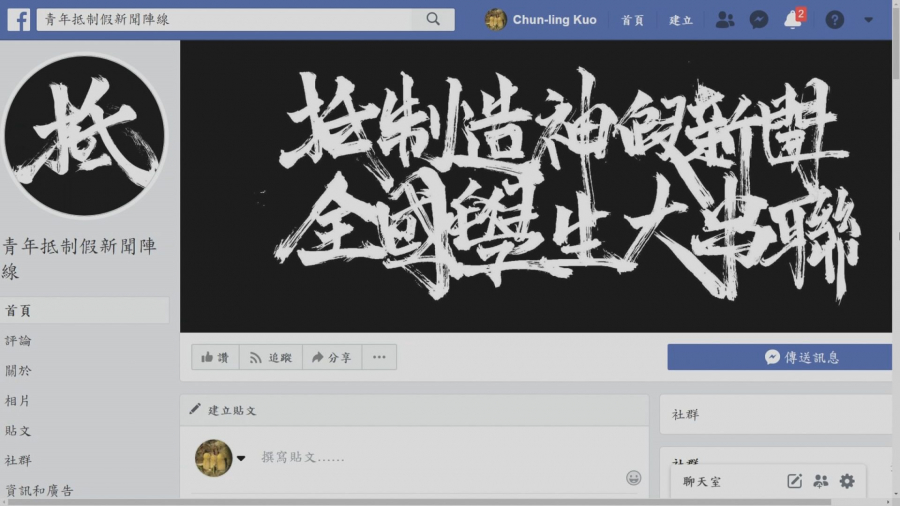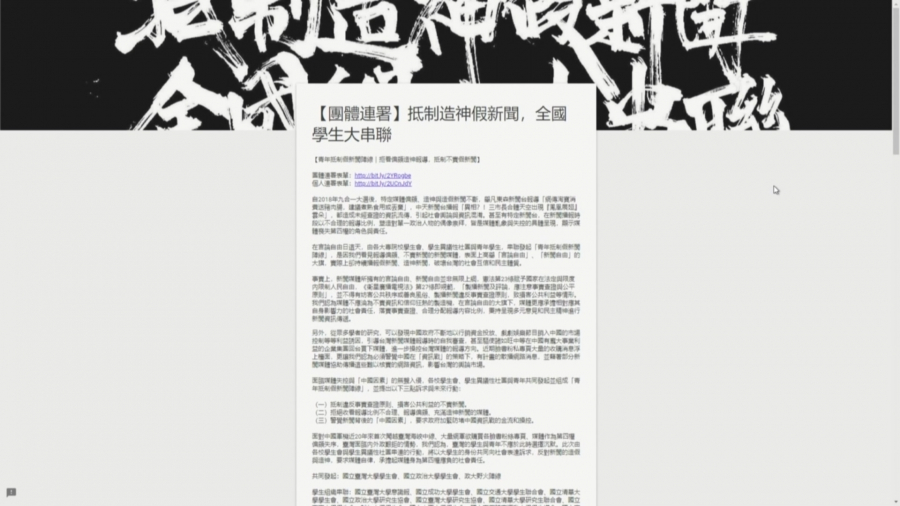Students Speak Out Against Fake News|抵制造神假新聞 50個學生團體連署

發布時間:
更新時間:
Last month, National Taiwan University and National Chengchi University students launched a boycott against several television channels. Recently, 50 student organizations from various universities, including NTU, NCCU, and National Cheng Kung University, joined forces to establish the Youths Against Fake News Front. They will boycott news reports that are biased or have not been fact-checked, and will also warn people about the "Chinese factor" behind news.
The Youths Against Fake News Front was formed by around 50 student organizations from National Taiwan University, National Chengchi University, National Cheng Kung University, and other schools. It urges everyone to boycott news reports that have not been fact-checked or are biased. It also reminds people of the so-called "Chinese factor" behind news to call on the government to resist China's manipulation of news.
When the media touches upon public policy or some controversial issues, or a politician issues a statement that could have an impact on public interest, you need to rationally reflect on the different viewpoints. It must accept a certain degree of supervision, it is not purely a commodity market consideration.
With regards to the media's choice of issues, scholars say if "styles" are different, adjustments can be made depending on market direction and ratings. However, if issues involve "public interest," more viewpoints should be presented.
There are indeed many very strange fake news entering into
Taiwan from abroad. The news comes from a type of manipulated result, so people can't help but be skeptical that it could be a systematic or planned conduct. If the media cannot filter news, then of course it will face legal and market tests and pressure.
With regards to whether there is news related to an "information war" with China, scholars believe strange news is indeed present on social and communication software. The government needs to have more complete policies to respond to this issue if national security becomes involved.
The Youths Against Fake News Front was formed by around 50 student organizations from National Taiwan University, National Chengchi University, National Cheng Kung University, and other schools. It urges everyone to boycott news reports that have not been fact-checked or are biased. It also reminds people of the so-called "Chinese factor" behind news to call on the government to resist China's manipulation of news.
When the media touches upon public policy or some controversial issues, or a politician issues a statement that could have an impact on public interest, you need to rationally reflect on the different viewpoints. It must accept a certain degree of supervision, it is not purely a commodity market consideration.
With regards to the media's choice of issues, scholars say if "styles" are different, adjustments can be made depending on market direction and ratings. However, if issues involve "public interest," more viewpoints should be presented.
There are indeed many very strange fake news entering into
Taiwan from abroad. The news comes from a type of manipulated result, so people can't help but be skeptical that it could be a systematic or planned conduct. If the media cannot filter news, then of course it will face legal and market tests and pressure.
With regards to whether there is news related to an "information war" with China, scholars believe strange news is indeed present on social and communication software. The government needs to have more complete policies to respond to this issue if national security becomes involved.
大黑底白字,宣示抵制「造神」假新聞,台大、政大、成大學生會等近50個學生團體,發起連署,呼籲大家抵制違反事實查證原則,或是報導偏頗、充滿造神新聞的媒體,同時還要警覺新聞背後的中國因素,要求政府防堵中國資訊戰操控。
中正大學傳播學系教授 胡元輝表示:「如果你這個媒體涉及到公共政策,或者一些爭議的議題 或者是政治人物,發表出一種具有影響公共利益的言論的時候,你就必須要合理的反映不同的觀點,它就必須接受一定程度的監理,它就不純粹是一個商品市場的考量。」
學者指出媒體的議題選擇,如果是「風格」不同,當然可以看市場取向、收視率來調整,但如果議題涉及「公共利益」,就應該要呈現更多元的觀點。
中正大學傳播學系教授 胡元輝表示:「的確!在境外有滿多非常奇怪的假訊息進入到台灣,訊息是來自於一種操作性的一種結果,所以,不禁令人懷疑,它可能是一種有系統或者有計畫的一種行為,如果媒體在這個部分,它沒有辦法發揮過濾的功能的話,當然它就會面臨這樣的,無論是法律、或者是市場上的一些考驗跟壓力。」
至於部分新聞內容,是否和中國「資訊戰」有關?學者認為,目前在社交、通訊軟體上,確實會出現一些比較奇怪的訊息,如果涉及國家安全,政府應該有更完整的政策因應。











